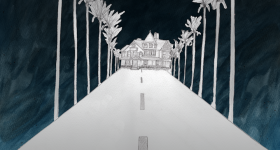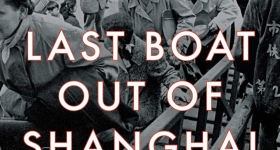At 16, I declared myself an atheist. My sister, quite surprisingly, was most put off by the announcement. She had never shown an indication towards devotion or tradition — not more than our family required of us — but something in her saw this as a betrayal. When she looked at me, perplexed, I could nearly read her mind: Are you ashamed? Are you shedding something?
Should I be shedding something, too?
My mother simply nodded and said, “Okay. Do what you’ve got to do,” as though she felt, somehow, that I would inevitably return to her side of this debate.
At 21, my mother’s patience was rewarded: I began to pray.
These were not unique prayers; my return to mantras echoed the most common reason to return to religion — I had a sick loved one. I watched my mother’s illness strip her body of its weight and ability to maintain a chemical balance, dim her brightness and confidence. It stole from her those things that I relied on the most — her steadiness, her constancy.
I was terrified. I attended pujas as regularly as I had as a child. I became fervently strict in my vegetarianism. I recited mantras in sets of nine when I woke up, before I slept and whenever a wave of panic at my mother’s mortality washed over me.
But those are just moments in a selfish religious journey, one that I began in order to make up for lost time, to save my mother’s life.
This matters more:
After nearly two years of watching my mother struggle with her health, I embarked on what could only be described in retrospect as an accidental international pilgrimage. The original plan was to coordinate with relatives and friends, some of whom I hadn’t seen in a decade, to visit them in their homes in India and western Europe. I was searching for a life reset, much needed after graduating from university and facing a general sense of disorientation. But then, in the first week of the trip, I managed to visit four mandirs in less than 24 hours, twice. I stumbled upon curiously divine moments like they were the sand beneath my feet.
Suddenly my reset was inextricable from the gods.
*
At the very end of the trip, as I prepared to leave London, my uncle stopped me at the door for a quiz. “Now that this trip is complete, where will you go next? If you won the lottery, where would you fly off to tomorrow?”
On the spot, I couldn’t remember the names of any cities in the world, never mind those that excited me. I offered continents, vaguely.
He pressed me to choose one — “What tugs at your heartstrings?” — and I balked.
Had I had the time and the words, and had he listened, I probably would have explained that my heartstrings can be pulled anywhere by a single sign, that I had begun to see accidental fortunes as sacred. Even though my mother had largely recovered by then, I continued to believe in hints from the greater universe, telling me to stay home or to travel. And if a sign was waiting for me, I didn’t want to accidentally block it by saying something I didn’t mean or something I would have to commit myself to.
In the immediate aftermath of his question, though, I began mentally stockpiling heartstring-tuggers — things that felt almost divine.
Like how, when I visited Point Reyes in early June, the unexpectedly chilly California ocean air had me weak at the knees for the state; how I was suddenly imagining a whole life where I moved there and found a job and fell in love; how I had to rein myself in before my impulsive dreams inevitably crashed to make room for reality.
Or how, when I stood in the shadow of the Sagrada Familia in July, eyes glued to the sculpted Passion, I felt such a weight on my soul; that in that moment, the looming body of Christ was the only religion in my life. Every question I had pondered in the world did not matter as I stood in the cathedral’s presence.
Or how, in the middle of the summer, a woman with rose petals in a temple in the Indian hamlet of Shirdi made me ache with such sadness and faith I could not comprehend. She stole my breath away. Her mud-caked feet gave away the distance walked on unpaved roads to get to the temple for 4 a.m. service, the first one of the day. My eyes turned downward as everyone sang and swayed with the morning chants, glancing over again and again at her feet. The flowers she had brought to offer to the marble statue at the head of the room rested against her ankles, bright golds and reds against her dirt-crusted toes. Her face is that of someone in a dream, some non-being, some stranger I’ve seen on a street but can’t piece together. Was she old? A mother? In crisis or at peace?
The music was loud, all-encompassing, full of the nostalgia that comes with a childhood spent reciting the stanzas again and again at the sides of parents, sandalwood burning somewhere behind us. Our bodies were synchronized waves sharing in one experience.
When she cried, when the music filled her bones and her prayers came out as tears, the women reached for her tissues and grasped petals instead: marigolds and pink carnations and red roses. She dried her eyes with these, nature’s tissues. The flowers she had brought to be blessed, to be gifted to the marble statue, were now physically weighted with her tears, with her suffering, with her joy and grace. This was the purest prayer, and somehow I had been lucky enough to witness it. I felt the urge to photograph her, but I don’t want her photographed. I want her painted, oils on canvas. I want her framed.
Her rose-petaled tears tugged at my heartstrings, a sign from the universe waiting for interpretation. Maybe it was a statement on the temple’s true divinity, or maybe it was just her — a sign that I should pay more attention to her. After all, when your gods are so nuanced that you never doubt their humanity, a lovely inverse also becomes true. I could not doubt the divinity of this rose-petaled woman.
*
Divinity is everywhere and in everyone. For example, my father is an angry god.
Many traditions have angry gods. Figures of fury come by the dozens, as guardians of war or fire or rage. The Aztecs had Huitzilopochtli, born clad in armor, ready to fight his family to defend his mother. His eternity is spent as the sun, chasing his luminescent siblings throughout the sky. The Germanic peoples had Odin, whose name from Old Norse to Old High German, Old Saxon to Old English, translates into fury and possessed madness. If 20th century theorization on god-creation and the human need for religion is only 30 percent correct, then these angry gods had beautiful stories because our angry parents didn’t have such beautiful ones.
My father carries no hammer. He bellows. He beats the table; he beats his chest. His fuse is short. His forehead twitches like Kali’s birth from Durga’s brow, twisted and sunken and blackened but ferocious.
I grew up with a pantheon of human-like gods, figures that my ancestors had created to guide them through drought and war and disease. These gods erred, like how Shiva mistook his own son for a stranger and chopped off his head. They came up with divine solutions, beautiful solutions, to these problems, like replacing the lost head of a son with that of an elephant. These colorful stories were my protective cocoons — assurance that even the most perfect of beings made mistakes, too.
People have such beautiful things to say about motherhood, but fatherhood is somehow always about raising children, disciplining children, protecting children. In Stephen Colbert’s I Am America (And So Can You!), a satirical quote accidentally and uncomfortably rings true: “A father has to be a provider, a teacher, a role model, but most importantly, a distant authority figure who can never be pleased. Otherwise, how will children ever understand the concept of God?”
All we have for divine guidance in this world are the stories our parents pass down, the hope that the rituals we think matter actually do. It’s both comforting and terrifying how fallible our gods are. But I hold onto their stories because they are all I have in a world so different from that of my family’s. Without these stories, it becomes impossible to discern how my parents came to be who they are. The gods connect me to a place on the other side of the world.
*
In June, as India’s monsoon season bared its teeth, my constant search for that connection led me to Dwarka, a small city on the Gujarati coastline. Weathering the humidity by basking in front of open refrigerator doors and shaded, cold tiles, I was growing weary of the heat and wistful for the breezes of northern California. The spontaneous side trip was the suggestion of a driver, a friend of a friend of my aunt, and when she told me to trust his tourism advice, I knew better than to question her. I frantically searched online for an understanding of the place as we drove up to its pillared gates.
I made my requisite round of the mandir, trying to give each idol something pure from within me, trying not to see each one as simply another representation of something familiar. Twisting my shoes back on, I finally asked the driver what made this place so special that we should have driven two hours each way.
“It was founded by Krishna,” he said, which is just as startling a sentence as if someone had said that the first governor of Athens was Zeus, or that Washington, D.C. was built by Christ. He gestures beyond the coastline. “Krishna lived on that island there and prayed here, in Dwarka.”
Since then, I’ve looked everywhere, searched online to corroborate his story, but these oral histories are too vast to be standardized. And the people of my driver — village people, with thick Kathiawar accents, close to the beaches of the western Indian Ocean — are also my parents’ people, and thus, also my people. I hold this story of Dwarka close because it feels familiar, like my grandparents too might have heard it, and their grandparents before them, and forever back until the story itself either happened or didn’t.
And it could be real. In a world where gods exist and come to our cities to fight evil or save goodness, Krishna could have founded a temple so that he, too, could pray. I don’t want to unquestioningly believe a story that meets no standard for truth or evidence, but I cradle this myth, imagining the need he, too, must have felt to find something to believe in. He could not have known everything. He would only have built a temple if he, too, needed answers like I do.
*
Something clearly fascinates me about fallibility in god stories. I grasp at straws to get to know the entities behind the signs I put so much stake in. Maybe Carol Christ, the director of the pilgrimage-leading Ariadne Institute, is right in her answer that "in God there is a woman like yourself. She shares your suffering. That history had been stolen from her.” Maybe we women, in particular, can connect to their abuses, their slights and secondary roles, in the patriarchal world that even goddesses are a part of.
Even though Carol Christ rejected the Hindu pantheon of goddesses for more nurturing images of a Mother, I can’t help but think of Sita and Radha through this lens. I grew up on the stories of these divine women, on the injustices and misinterpretations they faced. My mother was adamant in her belief of their strength. Who was Sita’s husband but a god who did not believe in her words, who doubted her purity after her kidnapping, assuming she had been dirtied by circumstances she was not even responsible for? She had to walk through fire to prove her truth, and then she chose to return to the earth instead of her husband because she would rather be within the dirt than return to the man who would not believe her.
What did it mean that Radha could represent everything from an unmarried consort to the love of Krishna’s life? It only mattered how conservative the lens of the community which prayed to her. I can’t help but think that my mother recalled her own marriage arrangement and move to America in Sita’s decision to join her husband on his banishment. She used these women as examples of strong but martyred womanhood, undeniably somehow like herself — women never appreciated for their full value. My mother used these stories to understand her life, to judge men and the patriarchal tradition in which she, and I, call our culture. Sitting at my mother’s feet, hearing her tell these stories, I wanted nothing more as a little girl than to share in Sita’s strength and Radha’s love.
*
I was born tied to a god, my name a whisper to a story from the past, to a world where deities could ask men to build them a temple so that they could find home on the ground. My namesake — Ashapura — is a goddess with seven eyes, who needed her temple to be built in a fantastic manner. She is a wish-granter, and she gave a man and his wife a child in exchange for their work on her temple. She asked that it remain closed for half a year. She needed this time to manifest within it — to become everything her people needed her to be.
What a weight on her celestial shoulders.
This temple is at the top of a hill in Ghumli, with 777 steps leading up to it. I climb in 107 degree heat, a trek I last made at the age of 4. Eighteen years later, I make this trek not with my parents dragging and carrying me up, but on my own two feet, to know what it is like to stand before the statue of a deity my entire life has recalled. I have answered to her name as long as I have understood language. I must know what it is like to pray to her, to close my eyes and let the thoughts drain out of me until all that is left are the feelings in my bones, calcium echoing across time.
Seven hundred and seventy-seven steps above where I started, the world is visibly different. The winds are cool. The temple, pink and orange and blue, contrasts starkly with the dusty brown that covers everything in this desert.
I sit down, cross-legged and well-postured, my wrists resting on my knees. I meditate before her, on everything and nothing. I focus on my breathing, on the way the air travels through my lungs. I am not thinking about anything — not thinking about my mother and her close calls with mortality, not thinking about the uncertainty of life outside of university, not thinking about whether or not there is a god looking out for me.
I feel calmer than I have in a long time. I have been searching for this, aching for this.
It might not have anything to do with this reverberating connection. She might just be exactly what she is: a statue. And I might just be a woman who shares two syllables with a myth. But even the idea of this kinship is better, I think, than no idea at all. I press my heels into Gujarati earth, as though the pressure might help me soak in something that my genetics know deeply and that my mind has only just begun to register. I want this connection to be made concrete. I, too, want to manifest here.
*
The day after I visit Ghumli is a golden day. At a marble-tiled temple on the Gujarati coastline, a carved window looks out at the great expanse of the Indian Ocean. The waves are riotous, crashing against the outer base of the temple, spraying up salty and chilly ocean water. On tiptoes, I can just make out the endless gray beyond the window. There is something unsettling about knowing that a half-foot of marble is all that separates you from the oceans. The world is filled with water, and the water is filled with nearly a million different species, crawling and feeding and birthing and twisting around with every incoming tide. We are filled with water, and our water too is filled with things feeding and twisting within us, microbiota in numbers that compete with our own cell counts.
The Sumerians had the first flood myth, when the gods sent down endless rain to punish the most evil of mankind. Christians reflected that first myth in their own, all those millennia later. But both myths paint gods as being certain of their decision, one of the biggest decisions a deity could ever consider making.
I prefer something else:
The Gros Ventre tribe, indigenous to what is now Montana, has a deity-focused flood myth, where the Creator felt his heartstrings tugged by the desire to re-create. So he sung and shouted; he stamped his foot down and the world filled with water. But after just days, he began to cry. His cramped position was uncomfortable; he could not smoke his pipe in peace. All the animals that he had so loved had drowned, and his good friend Crow had no place to land on the drowning earth. Not a single flower skimmed its surface. He regretted the instinct, the sign, which had told him to unbecome and to start anew. There was no one more powerful than him to show him that this mistake was okay to have made. What a lonely god the Creator must have been.
I sleep better with this story than the others.










Comments